Begining of the Ende
“I’m so glad to see people drawing a firm line in the coalfields, and stopping the planet’s largest coal-digging machines. We’re driven not by ideology but by physics: there’s simply no way to burn all this lignite and keep the climate intact. These protesters are lifeguards for an endangered planet.”
Bill McKibben
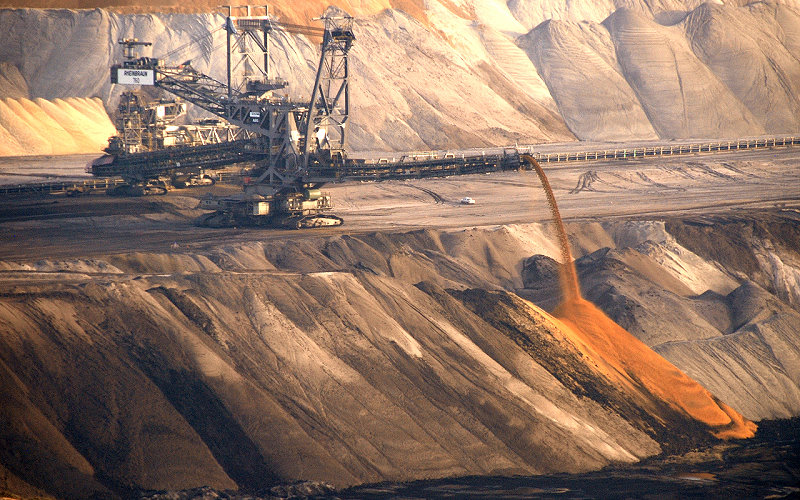 Photo: Tobias Mandt
Photo: Tobias Mandt
I’m running and I’m running and I’m just one, just one amongst hundreds of people running to escape the batons and the pepper spray, running to break through the police line and run on and on across the field to the mine. But as we’re running and my legs are pumping and the adrenaline’s thumping I turn and see something that makes my blood turn cold and time stand still. I see a man made massive with body armour and a helmet and a baton, and I see him throw his shoulder back and form a fist and smash the full brutal weight of his aggression into the face of an oncoming woman. She crumples but I don’t even see her hit the floor because I’m running and oh fuck me am I running and I’m thinking that this isn’t what I signed up for and I don’t want to be here and christ I’m just so scared. Because I am not an activist. This isn’t what I do. I’m a relatively normal, middle aged chap who does clicktivism when he can find the time. Direct action is not my thing. I’m not cut out to be here, running with hundreds of people across the fields of the Rhineland to try and close for one day a sodding great lignite mine.
And yet, oddly, here I am.
I am running because I don’t know what else to do. I am running because I know too much to stand still. I am running because climate change has already begun and because I’m scared of heatwaves and droughts and mass extinctions and flooding. I’m running because I need to act – we all need to act – and we need to act right now.
And so I’m acting as fast as I can, running from the police, running from my disempowerment, running from my apathy and fatalism. I’m running and dodging batons and pepper spray and I’m more primevally, viscerally terrified than I have ever, ever been.
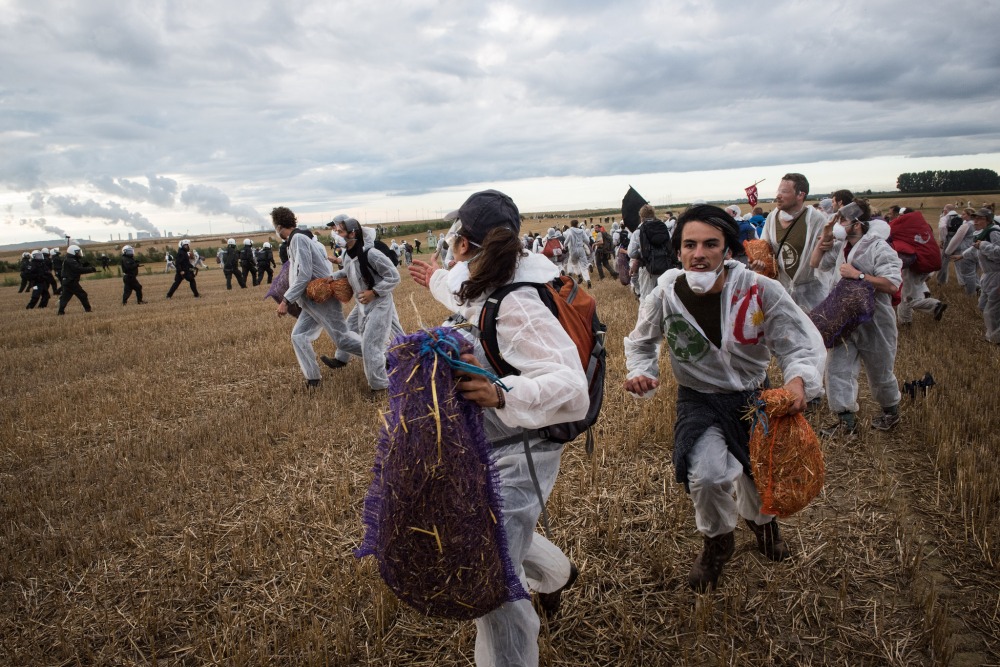 Photo: Ende Gelände
Photo: Ende Gelände
“REGROUP! REGROUP! REGROUP!” Through the chaos the call goes out and we begin to pull back together after breaking through the police line. People nursing baton injuries are helped by those who escaped the beatings, and those of us who can see lead those blinded by pepper spray. We keep walking, quickly re-coalescing back into the protective mass that two hundred determined people can be, but I’m feeling very, very shaken. This is so unlike anything I’ve experienced. The violence and brutality are horrible, and I wish I hadn’t come. I wonder how I could have been so naïve? I mean, what was I expecting when I signed up to gatecrash Europe’s biggest source of CO2 emissions? A welcoming beer and a hug?
And right now, walking through the fields with 200 other people all dressed, like me, in white paper boilersuits, I’m well out of my depth. This is not my scene. I’m a family man, too old for this kind of thing. Yes, climate change is important and there’s a role for me in the movement, but this isn’t it. I want out. I want to escape. I want to leave this stupid situation and go back to camp and help make tofu burgers, or something.
But then I realise that beyond the fearful chatter of my thinking, I’m committed. We all are. Others will be feeling all of this, but we’re here together and that means containing my fear and keeping on walking towards the mine. We have nothing but our resolve and our numbers and in honour of that I have a responsibility to keep my fear contained. I want no part in eroding what is our only strength.
And now, incredibly, it looks as if we might actually make it. The masts of the great pit diggers poke out of the earth just a field or two away and with no more police or opposition, we soon make it to the edge of the mine. The scale is barely comprehensible. It stretches a full 20km into the distance. It’s 12 long kilometres wide. And it’s so resonant with meaning: a great gaping hole in the earth from which billions of tons of coal have been dug, crushed and burned. It’s dramatic and terrifying testimony to what our species can do when it puts it’s mind to it, and a potent symbol for the challenge we face with climate change. And as I look out across the pit I find it hard to believe that we, as a collection of small, frail human beings, can really shut down a problem of this scale.
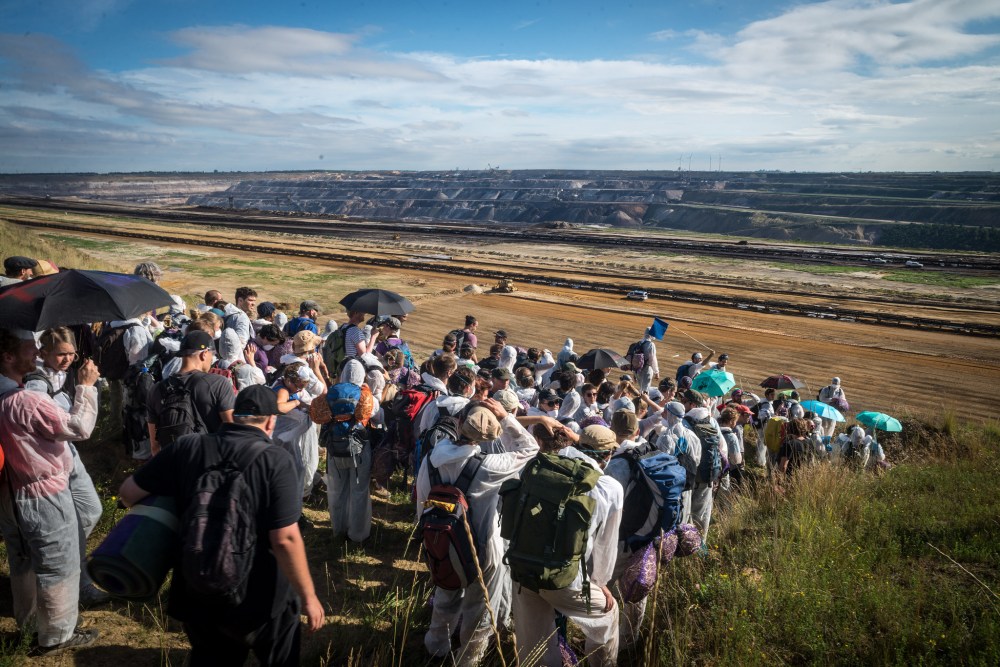 Photo: Paul Wagner, 350.org
Photo: Paul Wagner, 350.org
In truth, we don’t yet know if we can. We don’t know if we can descend into this beautiful hell and bring this beast to a halt. But we’re going to try. Eight hundred individuals from 45 countries are marching in four groups towards the mine; four fingers of resistance snaking across the Rhineland. We must look incredible from the air. The police helicopters must look down on these responsive white masses spreading and contracting in response to their colleagues’ attacks. But what they won’t see from those helicopters is one of the most significant aspects of this action: they won’t see how many of us are doing something like this for the first time.
One of the defining aspects of the action we call Ende Gelände (This far, and no further) is the number of newcomers to direct action. People like me who have never experienced police brutality or the terrifying experience of breaking through police lines. And why are there so many of us here? What is it that compels us normal, law abiding citizens to put our liberty and safety at risk? What brings us to leave our husbands and wives and children and engage in such radical and, frankly, out of character behaviour?
I think the answer lies in the urgency of the climate challenge and the feeling that action of some kind has become a moral imperative. We feel we are not acting simply for ourselves, but for our planet and our children. We feel a responsibility to those who are not yet born. And we feel the anger, sadness and incomprehension of those future generations who will look back at us with incredulity. “What a beautiful world”, they will think. “What kind of madness made our parents trash it?”
And if I have hope – which I do – then it is that we are entering a period which will be remembered as a time when normal people got together and did extraordinary things. Because when people begin to recognise the limitations of a system of individualism and self interest and begin, collectively, to seek change, remarkable things can happen.
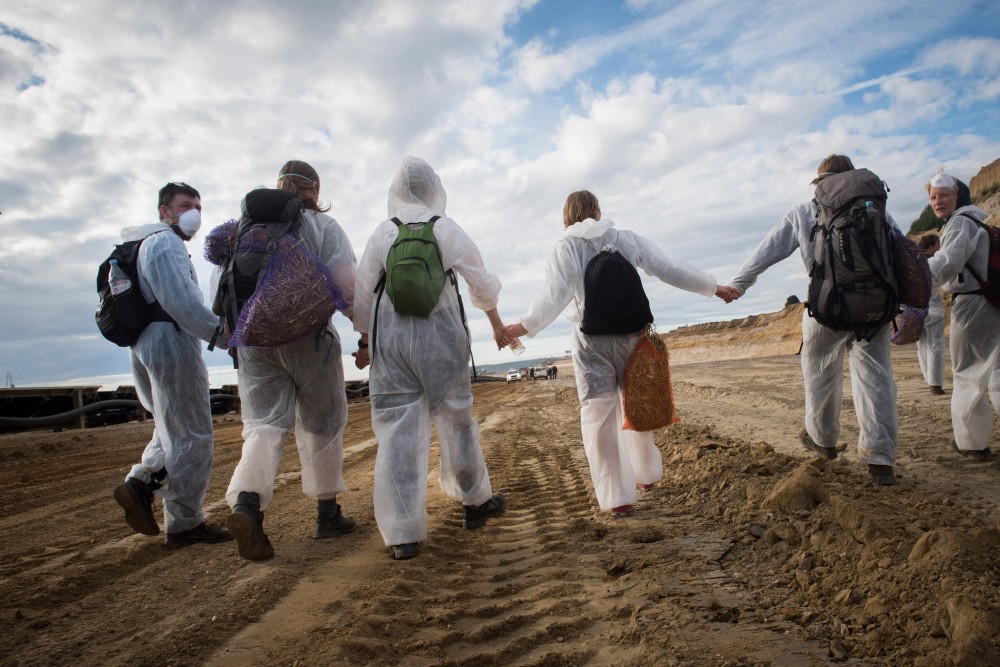 Photo: Ruben Neugebauer, 350.org
Photo: Ruben Neugebauer, 350.org
Which, of course, is exactly what is happening here. I am just one in a finger of 200, in an action of 1,000… but we are in reality a movement of millions. And this action for me is proof of how inconceivably powerful we become when we begin to act from our collective self. Nothing today would have happened without the collaboration of countless individuals, from those who help finance organisations like 350.org and Ende Gelände, to those who organise logistics, cook, translate and provide free legal representation at the climate camp. But perhaps most numerous are those many who – like my friends – send precious messages of support that say we do not act alone.
So together we flow over the top of the mine and down towards the diggers. We are chanting and singing and buzzing with a mixture of disbelief and hope, and we spill down towards two men beside an RWE mine vehicle. We must be a terrifying sight, this tsunami of white boiler suits, but we are non-violent and unstoppable. We’re singing and celebrating, giddy with elation and adrenaline, mindful of the jeeps in the distance but thrilled for now with success. I begin thinking that perhaps the police are behind us, perhaps they’ll leave the action to the mine staff. And for the first time since breaking through the lines, the fear begins to recede.
And as it diminishes, so my attention widens to appreciate this incredible place. To our right an endless cliff winds around the rim, an artwork of sandy pigments gouged with the striations of digger teeth. To the left the mine drops down into to the distance in a series of terraces, each leading deeper into the earth that gets darker and darker, then turns to black. And across this pit roam the diggers, unimaginable beasts with bucket teeth and vast steel throats, gouging and disgorging the coal onto conveyor belts 16km long. The pit is beyond comprehension: a raw mix of extreme beauty, and utter devastation. And we must descend into it in our search for change.
Our white finger marches around the corner past a huge, stationary belt and the terrace opens out. Several miles away we see the closest digger cleaving sandy overburden from the rim. It’s not Bagger 288 as we’d hoped, but it’s still big beyond reason. The distant jeeps are getting closer, but we are thrilled that our target is in sight…
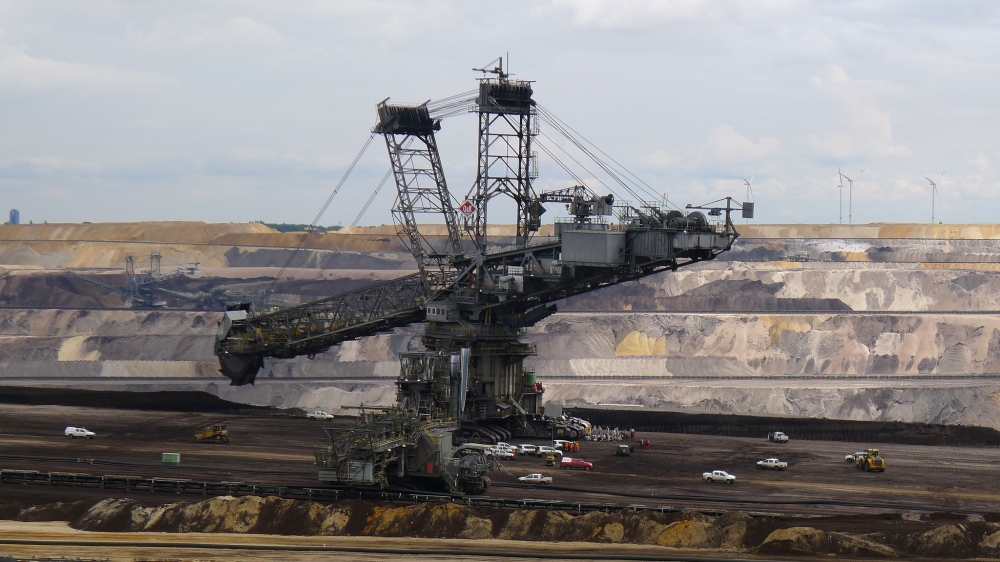 Photo: Ende Gelände
Photo: Ende Gelände
Middle of the Ende
“Non-violence is the greatest force at the disposal of mankind. It is mightier than the mightiest weapon of destruction devised by the ingenuity of man.”
Gandhi
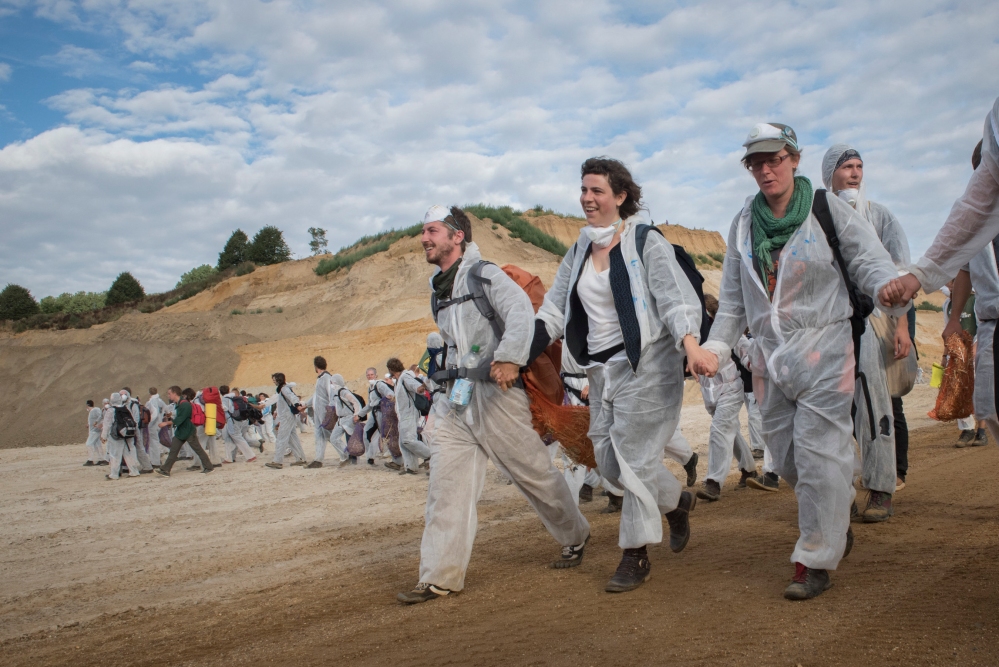 Photo: Ruben Neugebauer, 350.org, cropped from original. Licensed: CC BY-NC-SA 2.0
Photo: Ruben Neugebauer, 350.org, cropped from original. Licensed: CC BY-NC-SA 2.0
Time goes weird and space gets warped inside the mine, and into my hallucinatory world I only dimly recognise the distant RWE mine jeeps as a threat. I’m still holding onto my belief that the police have left us to the mine workers, but then as the jeeps pull closer and clamour to a halt in a cloud of orange dust, as the doors open and black figures jump out, it dawns on me slowly, thickly, stupidly, that the violence is about to start all over again.
The calls go out: “TIGHTEN UP! COME CLOSE! COME TOGETHER!” And we do, forming a dense crowd, holding arms together, still walking quickly towards the police who are putting on their helmets and drawing their batons and unholstering those burning cans of pepper spray. And as their faces disappear behind visors, they loose the last vestiges of their humanity. We are marching towards a squadron of machines.
“RUN! HEAD RIGHT! HEAD RIGHT!” We begin to run as a mass and the police begin to run too, running to intercept us as we seek the freedom of a diminishing gap between them and the wall of the mine. In moments we are split and all running all over again, all running at whatever direction looks safe at whatever speed we can manage. I am still packed within the mass and catch only flashes of uniform beyond the bodies that protect me, but then the protection dissolves and I see the dark figure with a baton that’s cracking into all the legs and arms and bodies it can find.
I don’t know what happens but somehow I am still running and the policeman is behind, and I’m running and my lungs are screaming and my legs are as heavy as lead. I don’t know how much more I can run. The ground beneath our feet is treacle sand, uneven and bumpy, and I see the policeman stumble and fall and then recover, lumbering with the weight of his armour.
And then we’re through. We’ve broken through the line and the police are behind us. We are closer to the digger. I feel a wild rush of optimism and hope, but then turn around and see the police jumping back into their jeeps. They will overtake us and beat us, again and again and again.
For me, this is the end. I cannot go on. I am so desperately tired, I haven’t slept in days, my legs are shredded by the terrain and the running and the heavy rucksack, and my mind is eviscerated by the endless convulsions of hope and fear. I am too exhausted to continue. But then, to my infinite surprise, I find myself running again.
As the jeeps bear down on us from behind, the call goes out: “MAKE A LINE! MAKE A LINE!” and something remarkable happens. Self organising and intuitive, our finger spreads across the length of the terrace, arm in arm and hand in hand, and suddenly it is the police who are trapped and impotent. They cannot break through. It’s an incredible moment, and the symbolism is not lost on us. We are, literally, a long white line in the sand. Together we stand against the vested interests and distorted economics of the coal mine; living testimony to the power of what’s possible when collection and conviction combine. And as the jeeps follow, disempowered, a crazy sense of optimism begins to flow. We are suddenly, unexpectedly, in control.
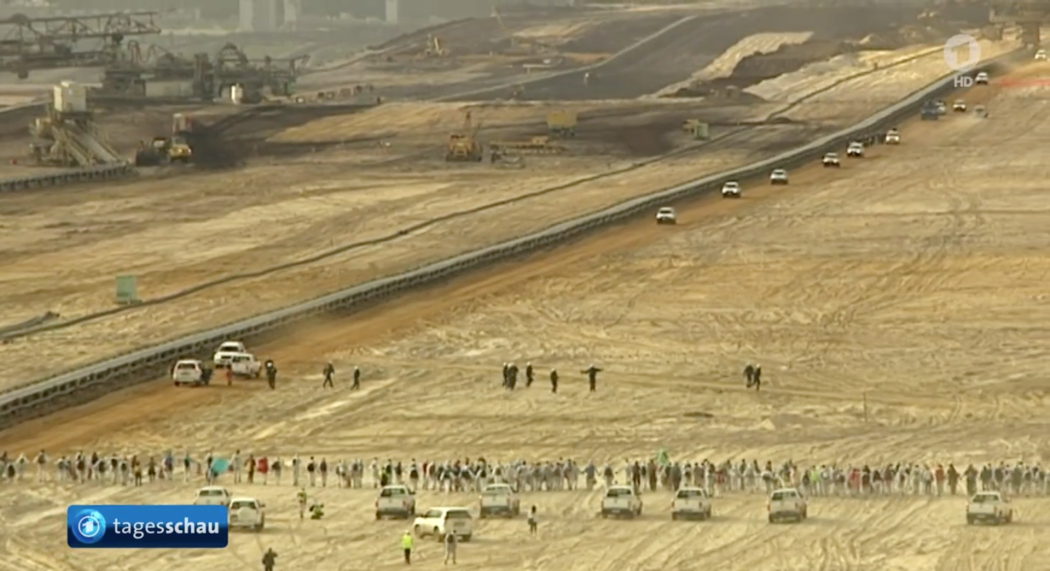 Click for video.
Click for video.
For me, this is a seminal moment. It is the first time I have seen so directly the power of connected action. They may have jeeps and batons and body armour and chemical weapons. They may have the law on their side. But against two hundred people marching from the conviction that their action is moral and their protest just, there is little at this moment they can do.
It’s hard to overstate the importance of this conviction, because it’s the base from which we act. It binds us to each other and connects us with the millions of unseen supporters around the world. Born of the raw, scientific evidence now emerging around climate change, it’s a conviction we’re prepared to test by throwing our bodies in front of monstrous diggers and speeding jeeps. We are convinced that our right to life will guide the driver’s foot to the right pedal. And it does, over and over. As gaps open up and jeeps attempt to punch through, we hurl ourselves before the revving engines and spinning wheels and send police passengers lurching as the driver hammers his foot to the brake. Over and over, again and again, a last minute foot to the brake.
This is what we come here seeking: a foot to the brake.
Because today this mine has become a crucible, a place where every action is amplified, every moment symbolic. Here, state police travel in corporate pickups. Here, black uniforms beat white boilersuits. Here, songs and chants meet batons and pepper spray while diggers gouge the earth and turbines salute the sky. So a foot to the brake, please, if you will. Peacefully but persistently, we’re asking that you stop.
But for the police, for the mine workers and for RWE’s owners, our requests are not the point. That we are many and peaceful and dignified is secondary to the fact that we are breaking the law. We are obstructing a legal corporate entity from going about it’s business, and we have to be stopped. So when I see a crowd of RWE jeeps in the distance – now passing the digger, now hurtling towards us with venomous urgency – I know what’s coming next.
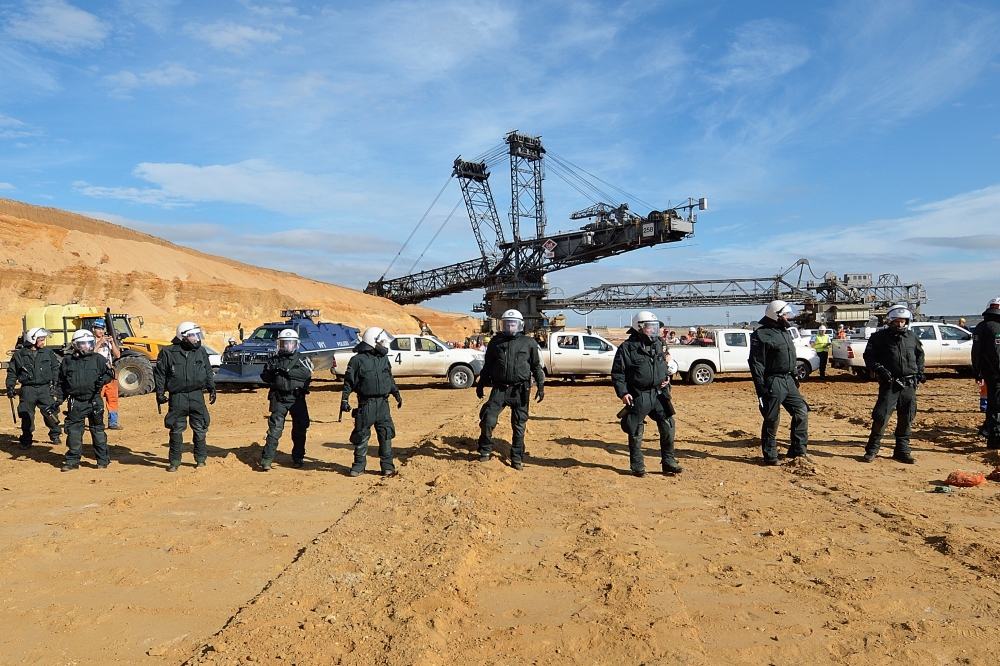 Photo: Tim Wagner, 350.org, cropped from original. Licensed: CC BY-NC-SA 2.0
Photo: Tim Wagner, 350.org, cropped from original. Licensed: CC BY-NC-SA 2.0
“COME TOGETHER! GET CLOSE! COME TOGETHER!” We break our line and we break our magic and we huddle once again into our amorphous, protective mass. The jeeps behind join the those in front and police swell like an incoming wave. They spread across the sand and, gathering momentum, break over us in a crazy, frantic, violent melee.
Everything goes mad and there are police everywhere. There’s nowhere to run, no gaps to exploit, and they’re pushing us again against the wall of the mine. I’m running and running and now I really am close to my end. The air is full of pepper spray and everything is burning, so when I see a dark figure before me, scything white figures like grass, I am part thankful, part fearful, part relieved that it will be over soon, that I will be hit and hurt and fall. I won’t have to run any more, won’t have to dodge any more, won’t have to bear this excoriating rollercoaster of adrenaline and hope and fear.
And them I’m over, face down in the sand. People run past and over me. There’s screaming and shouting. I don’t know what’s happened. Have I been hit? I look up and see wave after wave of people flow past, all trying to escape, all trying to go on, all trying to avoid stamping on me if they can. And I cannot get up.
As I realise this, I’m washed with the most enormous sense of relief. There is nothing more but to close my eyes and huddle into a shameless, foetal ball, hoping and praying I won’t be beaten and sprayed as others have by a vindictive passing officer.
My face is burning. I try to look up and cannot open my left eye. It is on fire. My hands are on fire. Everything is burning. Pepper spray hangs suspended in the air.
As soon as I’m able, I look up through my one good eye and see people nearby crying out in pain. The police are busy wrenching arms behind backs and strapping them tight with cable ties. The capsicum has diminished, but the air is full of fear and adrenaline and fury: “SIT DOWN!” ”STAY THERE!” “DON’T MOVE!”. And so I lie there and feel the burn growing as I wait for the situation to calm.
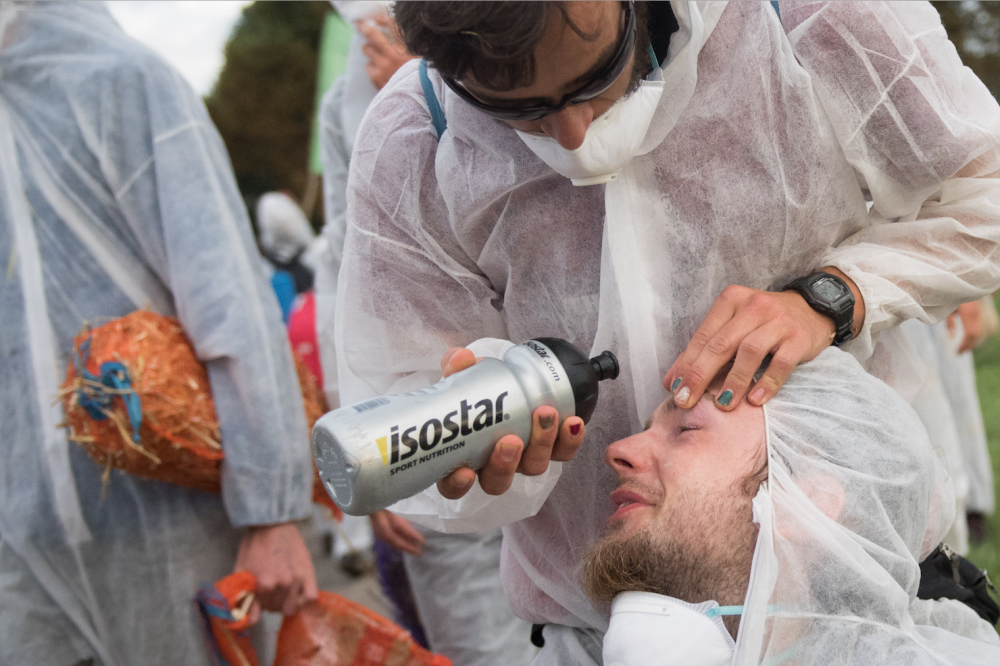 Photo: Ruben Neugebauer, 350.org, cropped from original. Licensed: CC BY-NC-SA 2.0
Photo: Ruben Neugebauer, 350.org, cropped from original. Licensed: CC BY-NC-SA 2.0
Unfathomable time passes, or it doesn’t – I can’t tell. But then I lift my head and catch the eye of the nearest officer through his visor. There is a guy between us writhing in agony. I ask permission to help but am ordered to stay down. More time – or not – and I try again. And now I see the face of a bearded, late middle aged man beneath the helmet. He’s looking at me and nodding. So I get up and move slowly and deliberately to the guy who’s face is red and eyes and nose are streaming. I pour water to flush away the searing chemical burn. He’s been sprayed directly, and from close up. He’s in agony. Everywhere people are in similar pain, and everywhere those of us who are aren’t too injured are moving slowly, cautiously, unthreateningly, doing whatever we can to help.
Remaining unbound is a powerful privilege, and I know how lucky I am. My pepper wounds are limited, and I’m uncuffed and mobile. But this is the lesser fortune. The greater is in being able to help, being able to tend to people and replace the relentless fear and terror of the past few hours with something oh-so much warmer and nourishing. The urge to reach out is powerful and instinctive and healing, and it’s animating all of us who are capable of helping.
We squeeze water into streaming eyes, wipe the capsicum burn from faces, give food and drink to those whose hands are locked behind their backs. All boundaries are down, all social conventions subsumed to the greater imperative of care. I blow a woman’s nose for her. I wipe sand from someone’s face. And as I gather a man’s hair in a topknot to prevent more blinding pepper in his eyes, the unexpected tenderness fractures something: the world begins to swirl and I well up and very nearly break down because when I look at my hands I’m setting my young daughter’s ponytail with an infinite, fatherly care. Injected into this crazy scene, injected into my over-stressed psyche, the thought of her is too sudden and too raw. But I realise then that one day, she might wind up some place like this. One day she might feel like the many brave young women who have come here; compelled to take her protest to a place where she is harmed.
Our finger has been broken into two groups and comprehensively stopped. The police have us kettled and stand around now like a perimeter fence. As we go about helping each other they remove their helmets, and one policeman hands me a bottle of water to help rinse someone’s eyes. They have become human again. I’m surprised by how many are women.
As the tension ebbs and the pepper burns fade, our identities change. We are no longer a defiant, running protest, and the police are no longer brutal enforcement machines. We are instead a mutually frazzled group of people in the bottom of a vast, multi-hued hole in the ground, our human scale dwarfed by the enormity of the mine. The binary symbolism that’s coloured much of the day fades a little and, as it goes, things begin to feel ever so faintly absurd.
At the end of the day, we have been beaten and stopped by people who are not so alien to our values. We discover this thanks to a calm, intelligent German guy who has taken to negotiating with the police. When we meet up to discuss our collective options, he points out that although they can’t say so, many of the men and women encircling us agree in principle with our protest. It’s a pretty odd thing to hear. Odd to realise that in spite of the brutal reality of the past hour, we are all just playing our parts in a much wider political game.
As the hours pass and the sun climbs, we begin to discuss what to do next. There are three other fingers in the mine, all trying to bring operations to a halt. But how can we help them, handcuffed and impotent in the sand? When someone points out that we are not legally obliged to assist the police with our removal from the mine, we realise we can passively resist. Going floppy, it is suggested, will make us very heavy, and very inconvenient. It will take four police to carry each and every one of us the long distance across the sand to the meat wagons, and we are still great in number.
It seems our protest isn’t over just yet…
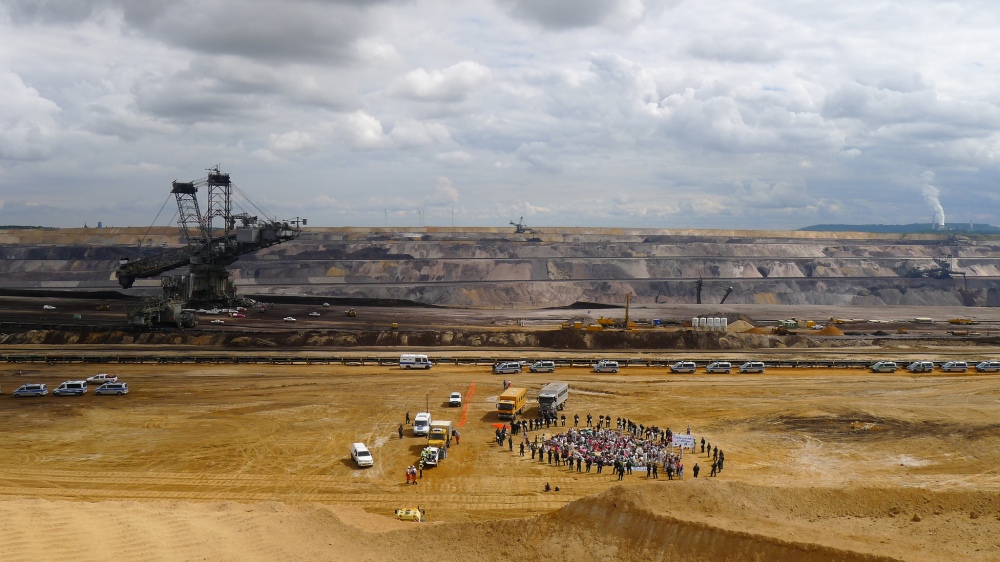 Photo: Ende Geleande, https://creativecommons.org/licenses/by-sa/2.0/
Photo: Ende Geleande, https://creativecommons.org/licenses/by-sa/2.0/
A word of explanation
If you’ve got this far, thank you. It’s nice to have you along. I’m aware this is a long blog and there is more to come, but now have to ask your patience while I spend some time with my family and recover from what has been an intense and emotional experience. I will post the next instalments as soon as I can would encourage you to follow this blog if you’d like to receive notification when they go up.
If you’d like more information and images, plus ideas for ways to become involved, I’d highly recommend http://www.350.org and http://www.ende-gelände.org
Thanks again for all your support and understanding. It’s priceless.
Ben